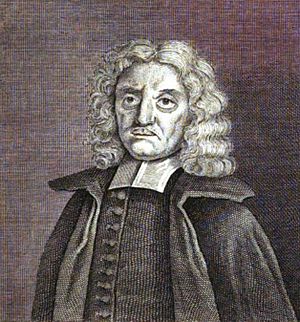Jeremiah White (chaplain) facts for kids
Jeremiah White (1629–1707) was an important religious leader in the 1600s. He was a Nonconformist minister. This means he did not follow the official Church of England. White also served as a preacher to the English government, called the Council of State. He was a Puritan chaplain to Oliver Cromwell, a powerful leader in England.
Early Life and Learning
Jeremiah White started studying at Trinity College, Cambridge, in 1646. He earned his first degree in 1649 and a master's degree in 1653. During his time as a student, he thought deeply about religious ideas. He found comfort in the idea of universal salvation. This belief suggests that everyone will eventually be saved. He later wrote a book about this idea called The Restoration of All Things. It was published after his death.
Serving Oliver Cromwell
After finishing his studies, White went to Whitehall. This was a major government building in London. He became a personal chaplain to Oliver Cromwell. Cromwell was the leader of England during a time called the Protectorate. White also preached to the Council of State, which helped Cromwell govern.
White was well-liked because he was charming and witty. He became close to Cromwell's family. There is a famous story about White and Cromwell's youngest daughter, Frances. Cromwell once found White kneeling in front of Frances. White quickly explained that he was actually asking Frances for help. He said he wanted to marry her waiting woman, but she had refused him. Cromwell, being very clever, used this chance. He spoke to the waiting woman and got her to agree to marry White. Cromwell then arranged for them to be married right away.
After the Restoration
When the monarchy returned to England in 1660, a period known as the Restoration, White lost his official position. He did not have a regular income. However, he remained popular. He also avoided getting involved in the big religious arguments of the time.
White gathered a lot of information about the difficulties faced by dissenters after the Restoration. Dissenters were people who did not follow the official Church of England. Later, King James II offered White a large sum of money for his writings. But White refused because he did not want to harm the reputation of the established church. His writings about the dissenters are now lost.
Jeremiah White himself never joined the Church of England. He sometimes preached in an independent church in London. He also preached in a town called Elstree. White was part of a club that met yearly to remember important historical events. He passed away in 1707.
 | Calvin Brent |
 | Walter T. Bailey |
 | Martha Cassell Thompson |
 | Alberta Jeannette Cassell |


